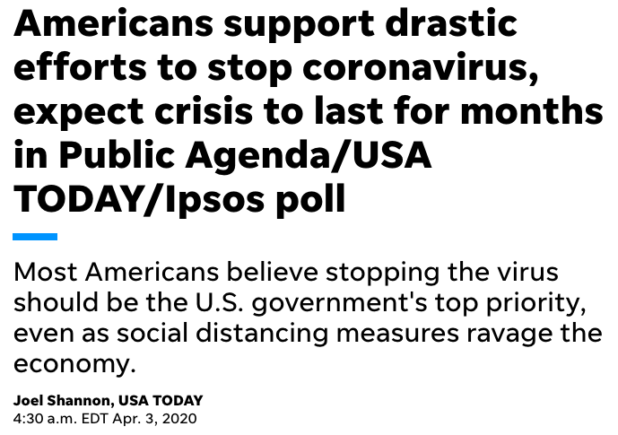Andrew Anglin
Daily Stormer
April 8, 2020
We heard a lot about “flattening the curve” in relation to Coronavirus infections. All we actually had to do to flatten that curve was wait until the weather broke and simply not pay attention to it, like we don’t pay attention to the flu every year where it kills tens of thousands of old and fat people.
But there is another curve, which will not be flattened.
That is the curve of total weekly joblessness claims in the United States.
Here are those numbers, from 1970 to this week, courtesy of the US Department of Labor:
And I don’t know how to tell you this lightly, but this hasn’t even begun to begin.
We are going to be looking at a minimum of 50% unemployment.
We can talk all about a system of debt financing being the backbone of the US economy, and how such a thing necessarily collapses under any form of pressure, but we can also talk about this in much more simple, practical terms: the US economy is a machine that has to keep moving, because there is no real backbone beyond financed debt. The only way to keep it moving is to have everyone both working and buying at the same time.
When a large group of people stops working, it creates a chain reaction, and the people who aren’t working stop buying, so this means that the people who are selling don’t have jobs and can’t buy.
We are a “service economy.”
The Atlantic, 2018:
The traditional understanding of goods as distinct from services dates back to the Industrial Revolution, when the advent of manufacturing created advanced economies and raised the standard of living for millions of people. But that dynamic flipped with the advent of the Information Age. Last year, the services sector—a broad category of the economy that now includes financial services, media, transportation and technology—accounted for 67 percent of GDP in the United States.
It is hard to imagine that the majority of that 67% of the economy will not be wiped out. The only remaining services are going to be either those necessary for human survival – food, electricity, some healthcare – and some services for the ultra-rich, who are going to remain largely unaffected by this collapse.
Oh, and there will be some media. Not just news media, but entertainment media as well. People have to be kept docile by something. Hollywood is pretty much finished, because literally no one is going to have $50 to spend on a date night at the movies, but Netflix and others will keep going. They will probably be subsidized by the government.
Basically, 100% of small businesses are going to be wiped out. All of the restaurants and shops are just going to be gone, right off the bat. People who do home improvement type stuff are going to be wiped out. Most of the financial sector is going to be wiped out. Even things like independently owned gas stations are going to be wiped out. Yes, people will still need gasoline, but people are going to be driving a whole lot less, and many people are going to be giving up their cars, as they move in with family members.
If you are estranged from your family, you’re going to have a very hard time, because the main strategy here is going to be extended families moving in together, sleeping in barracks-style bunk beds and pooling resources.
You will live to regret this:
Because the number of dead from this economic collapse is going to be 10,000 times the number of dead from this stupid flu.
I wish I could give you some good news, but there just literally isn’t any.
The biggest societal collapse in all of human history has already happened, and you just don’t know it yet because everything is on pause while you’re locked in your house.
I wish I knew more, and could explain this in better detail, but virtually no one is talking about it, because we are still talking about this idiotic flu hoax.
I wish I could tell you how to prepare for this, but I don’t think there is any way to prepare for it. I suppose it is a good idea to buy precious metals.
Gold has not yet gotten out of control.
And I personally think that Bitcoin is going to be a much more solid place to keep money than virtually anywhere else.
Bitcoin dropped off at the beginning of this, then it started climbing back up, and it may well just keep going.
I’m going to do a guide on how to get involved in Bitcoin safely, because I do think you need to at least be comfortable using it. There are a lot of ways it could come in handy in the near future.
But look: I don’t feel comfortable giving financial advice.
What I will tell you is that you should realize that we are just at the beginning of the worst economic collapse in all of human history, and that you need to figure out how you think this is best managed.
The last thing I want to do is give bad advice, and I don’t think that I’m in a position to give good advice.
Good advice right now is to do whatever you can to get on the best terms possible with your family, because you’re going to need them.
The age of decadence is over. We are now entering into a survival mode.
May God have mercy on us all.
 Daily Stormer The Most Censored Publication in History
Daily Stormer The Most Censored Publication in History








